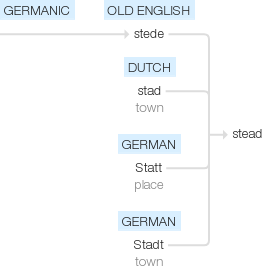Stead
Old English stede ‘place’, of Germanic origin; related to Dutch stad ‘town’, German Statt ‘place’, Stadt ‘town’, from an Indo-European root shared by the verb stand.
wiktionary
From Middle English sted, stede(noun) and steden(verb), from Old English stede, from Proto-Germanic *stadiz, from Proto-Indo-European *stéh₂tis. Cognate with German Stadt, Statt and Stätte, Gothic 𐍃𐍄𐌰𐌸𐍃( staþs, “place”), Danish and Swedish stad, Norwegian Bokmål sted, Scots steid, Dutch stad, Yiddish שטאָט (shtot). See the doublet stasis.
Clipping of steady.
etymonline
stead (n.)
Old English stede "place, position; standing, firmness, stability, fixity," from Proto-Germanic *stadi- (source also of Old Saxon stedi, Old Norse staðr "place, spot; stop, pause; town," Swedish stad, Dutch stede "place," Old High German stat, German Stadt "town," Gothic staþs "place"), from PIE *steti-, suffixed form of root *sta- "to stand, make or be firm." Related to stand.
Now chiefly in compounds or phrases. Meaning "assistance, use, benefit, advantage" is from c. 1300. Meaning "frame on which a bed is laid" is from c. 1400. The German use of Stadt for "town, city" "is a late development from c. 1200 when the term began to replace Burg" [Cambridge Dictionary of English Place-Names]. The Steads was 16c. English for "the Hanseatic cities."
